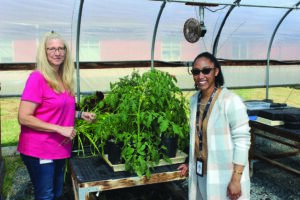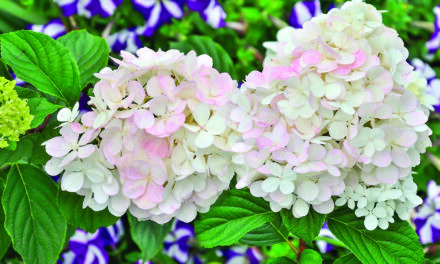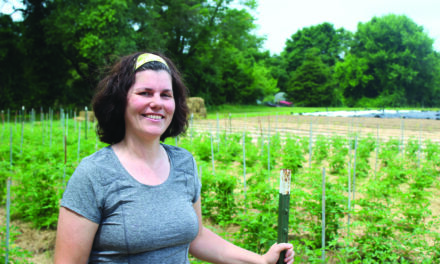
Activity associate, Mary Hershelman, left, and director of rehabilitation services, Tatyana Martin, said the value in the hospital center’s horticulture therapy program comes in many forms. Working with hands in the soil and caring for plants leads to discussion about life cycles, smells and tastes, ownership and responsibility, and emotional regulation. (Photo by Sean Clougherty)
Many people think of their gardens as a calming place, a quiet area that helps think through problems and relieve stress. For a select group of patients at the Eastern Shore Hospital Center in Cambridge, gardening and horticulture is an actual form of therapy and considered a key part of their rehabilitation path.
The hospital center is under the jurisdiction of Maryland’s Behavioral Health Administration in the Maryland Department of Health. It houses four psychiatric units for a total of 80 beds and provides inpatient mental health services for adults.
The horticulture therapy program has a long history at the hospital and a now-14-year-old greenhouse stands as its centerpiece. Patients can request to join the program and if their treatment team deems it an appropriate match, they work in the greenhouse in the spring, part of the summer and the fall to plant and care for a wide variety of species including vegetables, flowers and tropicals.
“I think it’s one of the best tools we have,” said Judith Slaughter, director of volunteer services. “You can do anything with horticultural therapy.”
The program promotes learning, responsibility, accountability and the opportunity to nurture and reap the rewards of their work, Dr. Olga Rosselló, the center’s chief executive officer
“Our patients realize they can learn new things, be creative, and make decisions, thus encouraging their confidence,” Rosselló said. “The horticulture therapy group allows them the opportunity to practice reaching goals by using different processes and persistence. Once they are back in the community it can enrich their lives and be a great way to engage with others, use their leisure time in a positive way, have health benefits from any foods they grow, or the beauty of the plants and flowers they grow and tend to. These are all items that can help them grow, stay connected, and be healthy and proud of their achievements.
Some of the food grown in the program gets used in a cooking group at the center and there is effort to again use its food in patient’s meals — a casualty of the pandemic when the greenhouse was converted to use as a shower. An annual plant sale helps support the program, too.
But those who work with the patients in the horticulture program say the real growth is in how they see patients respond to interacting with plants and one another.
“We’re constantly trying to tie the therapeutic properties of horticulture to real life,” said activity associate Mary Hershelman. “A lot of the participants haven’t had these life experiences to grow food and see how it’s grown.”
According to the American Horticulture Therapy Association, horticulture therapy can help enhance self-esteem, alleviate depression, improve motor skills and problem solving, increase physical activity, creative expression and build a spiritual connection to life, among many other benefits.
At the hospital center, Tatyana Martin, director of rehabilitation services, said many of those benefits come through in the horticulture program.
Working with hands in the soil and caring for plants leads to discussion about life cycles, smells and tastes, ownership and responsibility, and emotional regulation. If there’s a problem and plants die, there’s discussion about letting go and dealing with the loss, Hershelman said.
Activities also may focus on working independently or with a group. Developing these skills have been a key part in some patients moving on to a group home and getting a job outside the center.
“It lifts a lot of spirits,” Martin said. “The patients have a lot of pride” in being part of the program. “It really helps them get back to the human side of things.”
Grounding and mindfulness exercises are integrated through the whole system, Martin added, as the center also offers art, music and recreational therapy programs along with horticulture.
“It’s really more of a wholistic approach because you’re not just looking at one aspect of the person,” said Martin. “We have to have trust in them and we have to have the stability for them to come out here.”
The Eastern Shore Hospital Center Auxiliary supports the center with outreach and fundraising to benefit the center’s programs.
Along with the annual plant sale, the group helps manage the center’s A. May Thompson Shop and an upcoming “Christmas in July” Sale on July 20 and 21 from 10 a.m. to 4 p.m. in the Center’s English Hall.
“We do want to bring back the community into this,” Slaughter said. “My job is to reduce the stigma of mental illness.”
Patients often struggle with an internal stigma from being in the hospital center, Martin said, and the horticulture and other rehabilitation programs help empower them to see themselves for more than their mental illness.
“It’s critical for them to see it and understand what normal is to them,” Martin said. “Once they get that label, they internalize that that’s the only thing people are going to see.”
Martin said a great example of this empowerment was during the plant sale in May. As staff and the public flocked to get plants and flowers, the patients who grew them could see how their work put a smiles on others’ faces.
“They get so excited when they see staff with the flowers from the plant sales,” Martin said. “They gave me tips on how to take care of the flowers I bought.”






